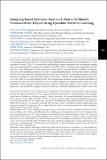Sampling-based sublinear low-rank matrix arithmetic framework for dequantizing quantum machine learning
Author(s)
Chia, Nai-Hui; Gilyen, Andras Pal; Li, Tongyang; Lin, Han-Hsuan; Tang, Ewin; Wang, Chunhao; ... Show more Show less
Download3549524.pdf (1.232Mb)
Publisher Policy
Publisher Policy
Article is made available in accordance with the publisher's policy and may be subject to US copyright law. Please refer to the publisher's site for terms of use.
Terms of use
Metadata
Show full item recordAbstract
We present an algorithmic framework for quantum-inspired classical algorithms on close-to-low-rank matrices, generalizing the series of results started by Tang’s breakthrough quantum-inspired algorithm for recommendation systems [STOC’19]. Motivated by quantum linear algebra algorithms and the quantum singular value transformation (SVT) framework of Gilyén et al. [STOC’19], we develop classical algorithms for SVT that run in time independent of input dimension, under suitable quantum-inspired sampling assumptions. Our results give compelling evidence that in the corresponding QRAM data structure input model, quantum SVT does not yield exponential quantum speedups. Since the quantum SVT framework generalizes essentially all known techniques for quantum linear algebra, our results, combined with sampling lemmas from previous work, suffice to generalize all prior results about dequantizing quantum machine learning algorithms. In particular, our classical SVT framework recovers and often improves the dequantization results on recommendation systems, principal component analysis, supervised clustering, support vector machines, low-rank regression, and semidefinite program solving. We also give additional dequantization results on low-rank Hamiltonian simulation and discriminant analysis. Our improvements come from identifying the key feature of the quantum-inspired input model that is at the core of all prior quantum-inspired results: ℓ2-norm sampling can approximate matrix products in time independent of their dimension. We reduce all our main results to this fact, making our exposition concise, self-contained, and intuitive.
Date issued
2022-10-27Department
Massachusetts Institute of Technology. Center for Theoretical PhysicsJournal
Journal of the ACM
Publisher
ACM
Citation
Nai-Hui Chia, András Pal Gilyén, Tongyang Li, Han-Hsuan Lin, Ewin Tang, and Chunhao Wang. 2022. Sampling-based Sublinear Low-rank Matrix Arithmetic Framework for Dequantizing Quantum Machine Learning. J. ACM 69, 5, Article 33 (October 2022), 72 pages.
Version: Final published version
ISSN
0004-5411